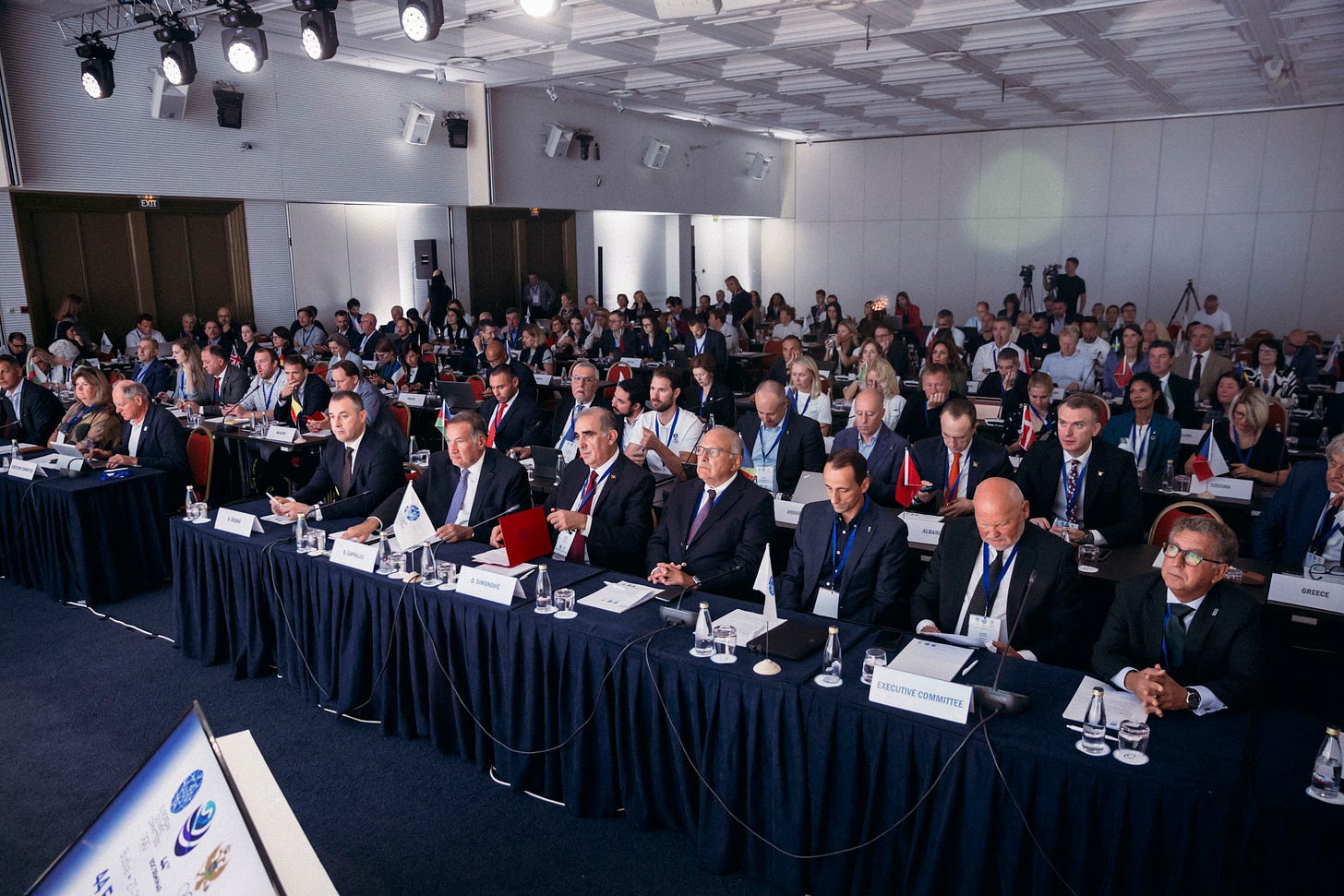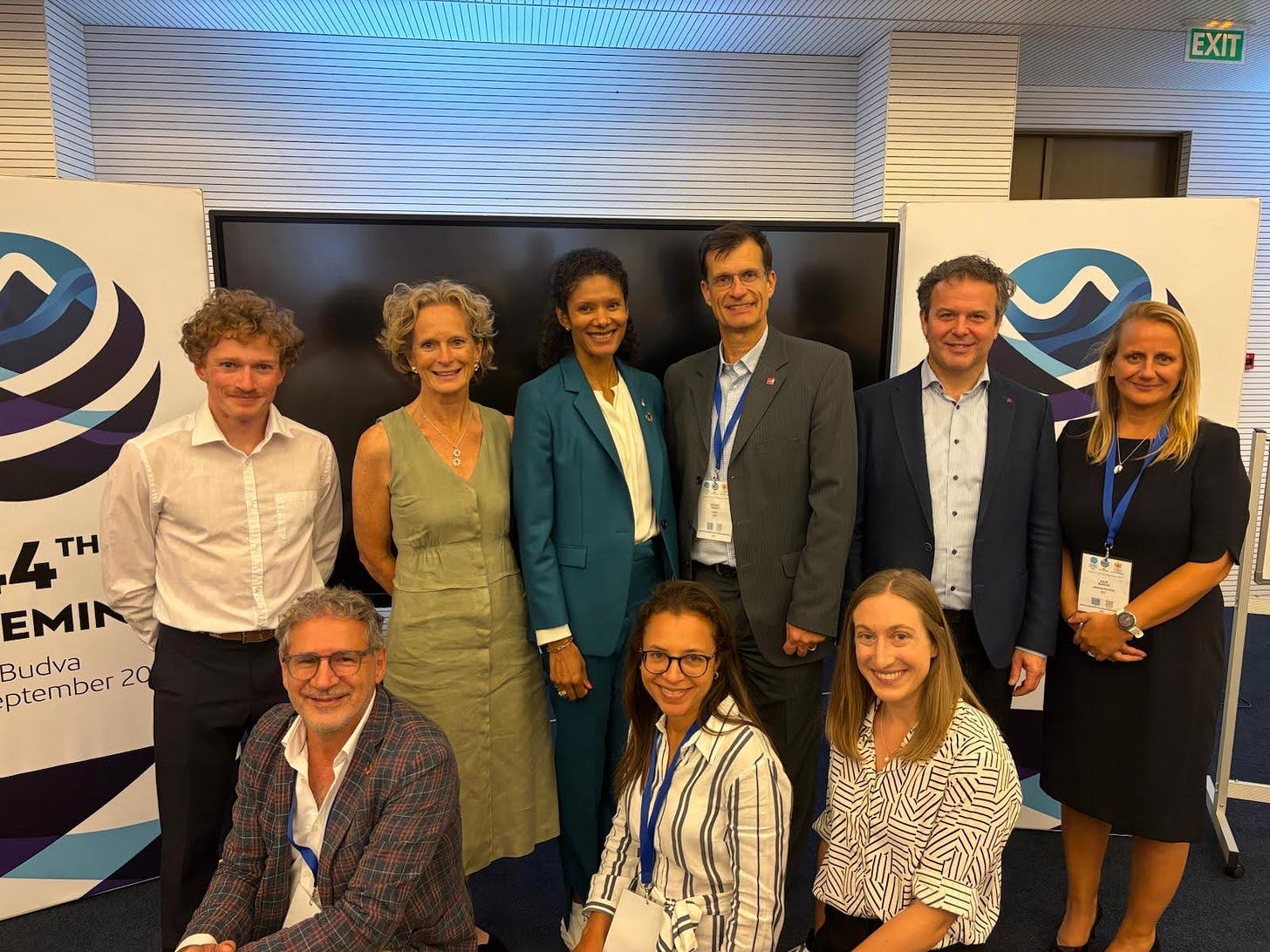Changing the System from Within: My Journey to the EOC Seminar in Montenegro
An Athlete’s Perspective on Sustainability and Advocacy at the European Olympic Committees Seminar
I’m currently a few thousand metres up in the sky, on board my Embraer E95 destination Geneva Airport. It’s been a very quick trip to a country I had never visited before for a very special event I was invited to speak at. On the south coast of Montenegro in an original town called Budva, I was attending the 44th European Olympic Committees Seminar. You may wonder why as a biathlete I was speaking at such a special event, and don’t worry, during the whole weekend I was telling myself exactly the same thing. But as I look back at my time during the conference and the input I was able to give to the National Olympic Committees, I’m incredibly happy I made the trip and I’ll be bringing you with me as I write about this adventure.
It all began in August when I got an Instagram message from Johanna Talihärm, a fellow Estonian Biathlete and a member of the Athletes Commission for the EOC. I remember her message quite well, she was asking me if I was available at the end of September to speak at an event in Montenegro. This got my excitement going straight away, the idea of being able to travel to a new country is always very fulfilling add to that the fact I should be speaking to an audience of sports enthusiasts and you had me wanting to go instantly. At that moment I didn’t know who I was speaking to and what I was going to have to talk about. Johanna explained that there would be more than one athlete and that we should work together to build a great presentation. (turned out I was actually the only athlete present). She put me in contact with Rune Arctander and this is when things started to be a little more clear.
Rune is in charge of International Relations at the Norwegian Olympic Committee, he was also given the role of organising and coordinating the speakers for the event I was attending and I was finally able to find out it was the European Olympic Committees Seminar. What I was meant to present was still very blurry and not precise but my trainer had given me permission to travel and a couple hours after the tickets were booked. Mid-September I hopped onto a video call with Rune to figure out what I was going to talk about, it turned out the theme of my presentation was very open and I kind of had the choice to speak about anything I wanted. The idea was to focus on my role as an Athlete Ambassador in Sustainability for the International Biathlon Union and to present the work my colleagues and I do in this role. After a couple of days of reflection, I landed on a keynote talk I titled - Changing the System from Within - with a focus on how as athletes we can change our organisation for the better.
Travelling to a new destination
The date of the trip landed at the end of a training camp week. This meant that I would be heading from my training camp in Prémanon, Jura straight to the airport in Geneva. The weather on my departure day was incredibly windy and very rainy, this meant I wasn’t missing much training-wise and made my conscience better. The drive down to the airport, even though I left at 6 am, was incredibly busy, with loads of people heading to work down in Geneva from the French border and not many people using public transport. I had plenty of time however and I was swiftly in the air heading to Vienna. Quick stop in Vienna and then my second flight to the capital city of Montenegro, Podgoriça. Around me on this flight I could recognize a couple of people with Olympic Committee equipment and some EOC partner clothing, nobody I knew however but at least I knew I was on the correct flight.
Flying over this brand-new country was amazing, I was able to discover the incredible landscapes Montenegro had to offer. I had never seen anything like it before, very vast mountains, untouched, with no infrastructure to be seen anywhere. Compared to where I live in France where we are building wherever possible it was quite a difference. The airport was very small for a capital city, with one small terminal building but incredibly busy, looks like some investments in expanding it might be on the horizon. I had a transfer booked along with other members of the Seminar to Budva which was about a 1h drive to the coast. This gave me some more opportunities to admire the amazing landscape on the way there. We didn’t go through any villages during the whole hour, but as we got closer I discovered this massive town surrounded by mountains called Budva.
No time to waste because as soon as we arrived at the hotel I had planned to head out for a run and I did just that. Along the coast to the wonderful old town of Budva, it had very tight streets and well-designed alleys, surrounded by this massive stone wall which I could only imagine used to protect the village from attacks. That evening we had the Pot d'Accueil which for me was my first opportunity to try and meet some people from the event. It started off very badly and I felt very lonely because everybody knew each other. But I was quickly introduced to the other speakers by one of the EOC Executive Committee members who was on the flight with me and then I was slowly able to speak to more and more people. I caught a quick glimpse of the conference hall I would be presenting in the next morning, and my excitement grew immensely. The night didn’t go on for long because the next day was seminar day and we had a lot of work to complete.
The 44th EOC Seminar
After having devoured what was one of the most impressive breakfast buffets I’ve seen in a long time, I changed into my best presenter’s outfit and headed down to the conference room. I’m not one to dress up in a suit very often and the outside temperatures were averaging 28 degrees so I wasn’t looking forward to having to wear this all day, but this quickly went away because as I walked into the conference hall I noticed the air conditioning was on and blasting cold air right at us. This wasn’t very sustainable but I asked why and according to science people are more concentrated and listen better at a certain temperature and this is what the room was set to. I looked for my seat and table among the many different delegations that were present and was happy to find some of the presenters who I’d met the night before already sat down. We were all sitting at the back of the room right behind the NOCs and the Executive Committee.
The morning started off slowly with the welcoming address from the EOC president, the Montenegrin Olympic Committee president and the minister of Sports and Youth for the country of Montenegro. We then heard from various representatives of the Paris 2024 Organising Committee, the Olympic Solidarity team and the Olympic Refugee Team. They were all highlighting the immense success of the European athletes and this summer’s Olympic games in Paris. 43% of medals at the games were won by European Athletes, this is an immense achievement for the EOC because they work on promoting and helping European athletes all year round. I was also very pleased to find out that more than 90% of all the refugee athletes are based and train with other European teams. European NOC are here to help the refugee program which is a vital part of the Olympic values (the IBU has also just announced a refugee team and I can’t wait to see how this evolves)
Next up we had the first theme-based talks of the seminar. There were two themes present during the 2 days, the first was AI and the second was sustainability. The IOC Chief Information Technology Officer Mr Corna was here to present the IOC AI Agenda, a vital framework that lays down 5 principles to stand by and also the focus areas that the IOC is working on in AI. This was really interesting because we then got to hear from representatives from Deloitte, Alibaba and Swiss Timing about how AI was used during the games in Paris. Lots of behind-the-scenes tech that shows the future power of AI and how it might be implemented at future games like MilanoCortina 2026 or Los Angeles 2028. The people in the room were mostly over the age of 45-50, so AI for them as it is for many people around the world is quite a scary and new subject, so to have proper teams focusing on this area and sharing their research is vital so that the EOCs don’t fall behind.
We then had what is arguably the most important subject and that was sustainability. The Organising Committee Director of Environmental Excellence from the Paris Games started this section by presenting what measures they had put in place to make the Paris Olympic Games the most sustainable yet and then it was my turn along with three other amazing speakers to hit the stage. Alongside me was Ms Rikke Rønholt Albertsen Sustainability and Active Society Commission member who gave an amazing talk on how sports must play a crucial role in driving sustainability through collaboration among stakeholders, securing societal legitimacy, and how NOCs should be positioning themselves as valuable partners in addressing global sustainability challenges. Ms Annamarie Phelps chair of the EOC Commission on Gender Equality, Diversity & Inclusion emphasised how sustainability goes beyond environmental concerns, with social sustainability being equally important, especially in terms of gender equality and responsible growth, which requires balanced leadership that includes diverse voices in decision-making and then finally Dr Holger Preuss a Member of the IOC Legacy and Sustainability Commission spoke on how the EOC, though late to the sustainability movement, has made progress since 2021, aligning with the IOC's approach of building a framework that connects sport to Sustainable Development Goals through a five-step strategy.
Taking the stage
And then finally it was my turn, I was called up to the podium by the master of ceremony. After having heard the amazing talks before me, my stress level was very high. But I knew my subject was important and I was confident I had prepared a great keynote. I set my notes down on the podium, lowered the mic (because Dr Preuss was a good 25 cm taller than me), grabbed the slide clicker and got going. My talk was on how as a Sustainability Ambassador for the IBU, I strongly believed that athletes can play a crucial role in moving towards a more sustainable future, although many athletes feel their voices aren’t heard. I mentioned how I’ve seen the IBU implement changes based on athlete recommendations, like using more sustainable packaging in dining halls and optimising schedules to reduce unnecessary travel. I finished off by encouraging all of the leaders in the room to keep looking for ways to improve sustainability and to rely on athletes for their insights. Because without athletes, there would be no sports. Athletes are not just athletes, we are and need to be partners in shaping the future of our sports.

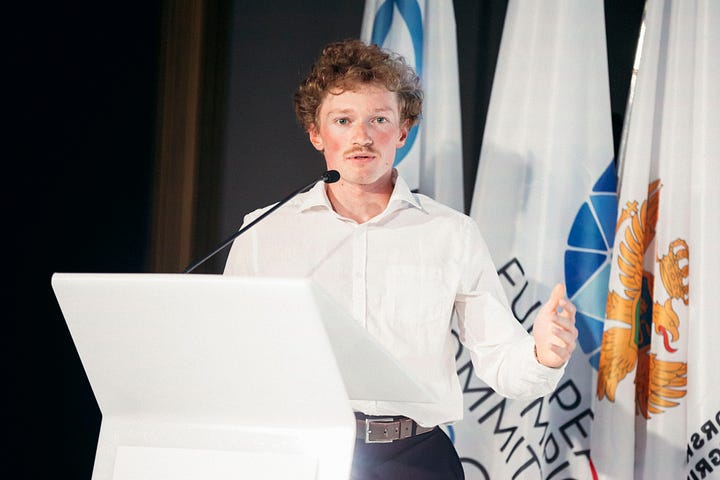
Talking about this subject on this stage in front of so many decision-makers was such an immense honour for me. I spend a lot of my time advocating for a more sustainable future with my fellow athletes ambassadors at the International Biathlon Union and after a talk like the one I gave last week, I feel incredibly accomplished. I was able to speak to the people who shape the way most national sports federations and organisations work. Everything starts at the top, and in many countries, the top is the National Olympic Committee. But the amazing part about being at an in-presence seminar like this and not just online in a video call is the ability to continue the discussion afterwards as well, and this is why I made the trip. I could have very well spoken through Zoom but the impact would in no way have been the same. Engaging with delegates from various countries broadened my understanding of how different cultures approach sustainability, inspiring me to think globally.
As I was the last to speak at 13h30 we then paused for a quick lunch break before splitting into two workshop groups for the afternoon sessions. Naturally, I attended the sustainability workshop to help continue the discussion on how important listening to the athlete’s voices is. The workshops were organised by the team at Deloitte who put a great emphasis on collaboration. All the Single Points of Contacts for Sustainability or SPOCs were part of the workshop as well. Speaking with many of them, this was the first time they were all united together in the same room. All these people are often alone in their organisations working towards sustainability and for them to be able to meet up and create links together was really important. During the workshops, we worked on how the NOCs can value partnerships, avoid greenwashing in their communications, but also improve climate action and gender equality. I was also able to give a more personal approach to how as an athlete I try to choose partnerships based on my values and how I manage to respect these values whilst travelling and competing around the world. Being the sole athlete among all the delegates was intimidating, but it taught me the importance of representing athlete perspectives courageously.
Overall I had an amazing time participating in this seminar, our discussions around sustainability were insightful and showed me that there are people in each organisation focusing on this subject and trying to improve the impact we have on society. Sharing our thoughts on the subject showed everyone that there is still a long way to go but the progress each and everyone makes should be celebrated. Setting tangible goals, measuring and communicating effectively on these is greatly important and this can’t be achieved alone.
I also had some fun
Don’t worry, I wasn’t just sitting in a room during my whole time in Budva. I also got to experience some social life. First off as part of the seminar we had a Gala Dinner on the second evening. We got to eat some incredible local dishes whilst watching some ballet and also listen to the Montenegrin Eurovision Song Contest singer who sang in at least 5 different languages throughout the whole evening. This was also a time to discuss more casually about everyone’s various projects and appreciate the work everyone does back in their home countries. On the final night, we also went out of the hotel into Budva to discover a traditional local restaurant, we ate more fish and enjoyed some more drinks.
I also had to train during my stay. As I left my training camp early it was important for me to continue putting in some training hours. I had planned to go to the gym daily and also head out to discover the incredible mountains that were surrounding Budva. But the combination of my days already being incredibly tiring and the local mountain paths basically nonexistent I didn’t manage to accomplish much. I had found a very steep road heading out of town and decided to run up to see how high I could get, it was incredibly steep, not in the best of conditions but did get me quite high. The view from the top was amazing and really made me want to come back with more time to hand and properly discover everything Budva had to offer.
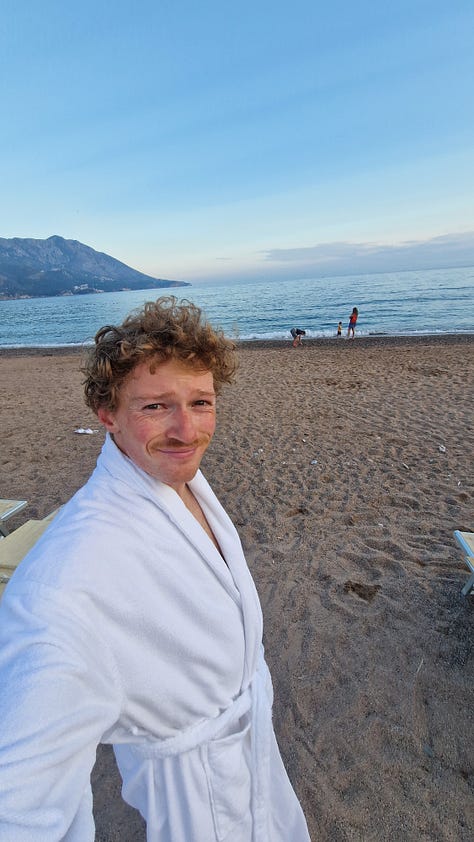

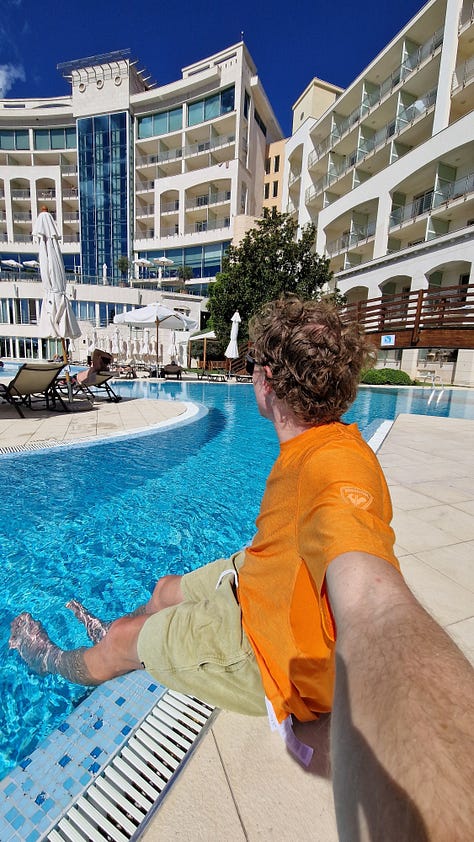
We were staying in the most amazing hotel right by the sea. This gave me the opportunity to head down to the beach only once sadly during my four days for a little swim. I also tried to visit the spa and wellness facilities the Splendid Hotel had to offer. Great times though sadly my Polar watch went for a swim in the laundry system after my visit and now needs replacing (future newsletter coming up on what replacement choice I made). The conference facilities at the hotel were also outstanding, that’s probably why we stayed here during the seminar. Only a short 4 days however because before I knew it I was back on the bus to the small airport of Podgorica and on the plane back home. I’m currently in the middle of a rest week and getting ready for a trip to Arçons for my next training camp next week.
Before I finish I would like to thank Berit Kjøll, Chair of the EOC Commission on Sustainability and Active Society for inviting me to speak at the conference but also Rune Arctander, Head of International Relations at The Norwegian Olympic and Paralympic Committee for mentoring me and helping me deliver my talk in the best way possible. Finally, I’d also like to thank the International Biathlon Union for empowering us athletes to be the leaders of tomorrow and to deliver the message about sustainability. I could not have done this without their help.




